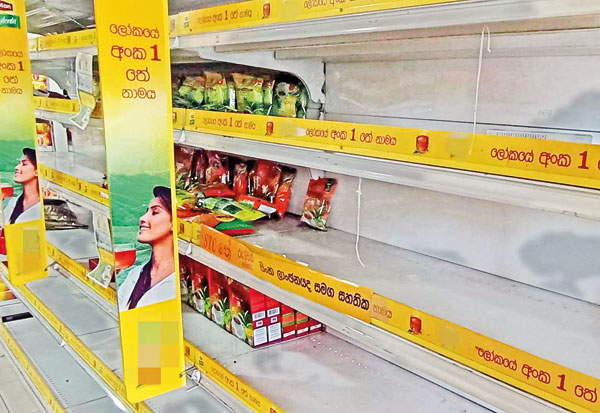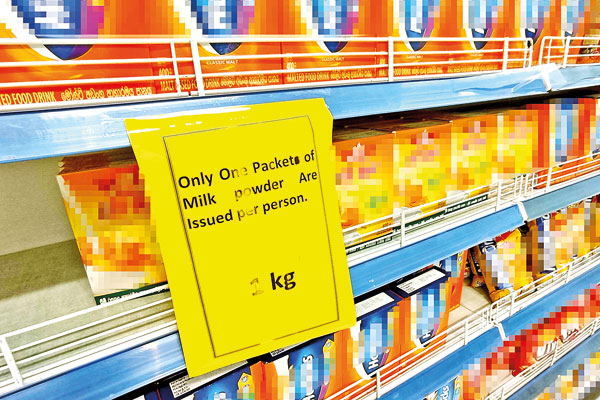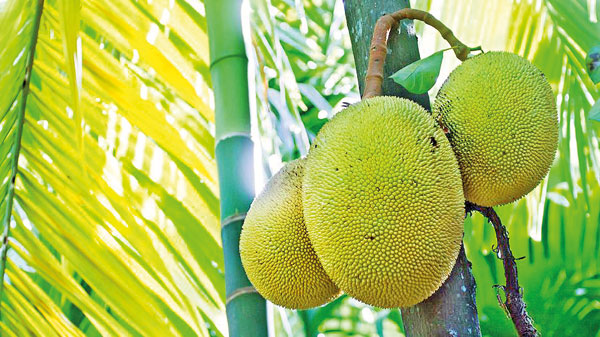News
Revised taxes, shortages propel food prices ever higher
Basic food stuffs remain in short supply, retailers are restricting purchases, while prices are expected to rapidly tick ever higher following sharp increases in taxes this week.
According to the Central Bank of Sri Lanka, food inflation increased to 57.4% in May 2022 from 46.6 percent in April 2022.
“Within the food category, increases were observed in prices of vegetables, fresh fish, rice, bread, dried fish, and dhal in May,” the bank said.

Sathosa shelves are fast becoming empty. Right : Supermarkets ration the sale of powdered milkfood. Pix by Akila Jayawardena
Many retailer are limiting the sale of essentials such as dhal, sugar, rice, milk and canned fish. Some stores allow only two kilos of sugar per bill. At other stores, a limited number of liquid milk cartons are released per person, while butter is limited to one slab per purchase.
“A 400 gram milk powder pack which was Rs. 380 last year is now Rs. 1,020 and liquid milk per litre is Rs. 430. The government should strengthen local milk production. We can have plain tea, but the children are losing the nutrition from milk,” said Anusha Jayasinghe, a mother of three from Ragama.
An egg now costs between Rs 40 and Rs 42 compared with Rs. 16 last year.
Canned fish sells for Rs. 450 and is issued in limited amounts in some shops and supermarkets.
“People are afraid that there might be a food crisis by August. The elderly are stocking up in fear of a severe shortage in the coming months,” said a shopkeeper in Maharagama. 
The prices of rice varieties are continuing to rise.
Nadu, raw rice, and samba sell for between Rs.220 and Rs.280.
A kilo of sugar costs more than Rs. 250 compared with last year when it was Rs. 117 to Rs 120 a kilo.
Healthy breakfasts are no longer affordable, with chickpeas sold for Rs. 621 a kilo whereas it was Rs. 301 last year.
Green gram and cowpea are sold for between Rs. 880 and Rs 1,200, and Rs. 500 to Rs 900 a kilo, respectively.
Preparing a wheat flour-based meal is also a pricey choice. Wheat flour has risen from Rs.92 last year to Rs.255. A kilo of Mysore dhal is sold for between Rs.620 and Rs. 680.
The price of dried sprats has increased from Rs. 700 a kg last year to over Rs. 1,500 at present. All types of fish and meat, too, are prohibitively expensive.
While the public struggle to buy essential commodities at a reasonable price, importers say assurances given by the Government will help ease the burden.
“The Government decision to lift import licences on 369 items and allow open account imports till June 7 is a positive move. Most of the importers are clearing cargoes,” said G. Rajendran, president of the Essential Food Commodity Importers and Traders Association.
He said imported rice, sugar, dhal, potatoes, onions, garlic and other essential goods will be available.
“We have received a favourable response from the Prime Minister’s office following discussions. The governor of the Central Bank has also assured arrangements to be made to release funds through commercial banks,” he said.
He said US$100 million (Rs 360.55 million) is needed a month for essential food commodities.
Despite the removal of import restrictions on non-essential goods, the increase in VAT from 8% to 12% will drive prices higher. Imported fruit juices, cereal, chocolate, dairy products and fruit will be much pricier.
Trade, Commerce and Food Security Minister Nalin Fernando told the Sunday Times that despite a fear of a global food crisis triggered by the Ukraine conflict, the government would take all possible measures to alleviate such a crisis here.
“We have no price controls due to the shortage of essential food. If more items are released to the market, we can introduce price controls.’’
The Consumer Affairs Authority has been asked to take legal action against traders charging exorbitant prices, and those creating an artificial shortage.
“Even Sathosa experienced a shortage of essential goods due to the dollar crisis. We are trying our best to strengthen Sathosa outlets by stocking them up with essential goods,” he said.
| Meals aplenty from much-loved ‘rice tree’Jackfruit, which is laden with carbohydrates and which Sri Lankan rural folk call ‘bath gasa’, has fast become a substitute for rice in the provinces in a time of economic calamity in the country, which is also now facing a severe food crisis. “Rice and fish, both fresh and dried fish, are expensive. Some just have ‘kos’ and coconuts in their meals,” said Mary Chitralatha from Pannala. Homemakers in the villages also make a delicious curry in a claypot, or ‘polos ambula’ with the seedless baby jackfruit, while the ripened, fragrant jackfruit is a treat in itself. Even the seeds of the jackfruit are boiled and eaten with toasted rice and shredded coconut — the popular ‘kos ata kalu pol maluwa’. Jackfruit pods are also sliced and fried as tasty chips coated with sugar. This week, the Agriculture Minister Mahinda Amaraweera asked officials to allow people to plant jackfruit in reservations. He also wants to plan them in Community kitchens have also begun to crop up to help Sri Lankans and some have started this week in Rajagiriya and Maradana. | |
 |
The best way to say that you found the home of your dreams is by finding it on Hitad.lk. We have listings for apartments for sale or rent in Sri Lanka, no matter what locale you're looking for! Whether you live in Colombo, Galle, Kandy, Matara, Jaffna and more - we've got them all!

